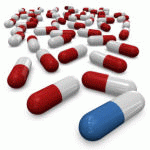Pharmacology
|
19 october 2019 23:00:33 |
| Occurrences and Outcomes of Immune Checkpoint Inhibitors-Induced Vitiligo in Cancer Patients: A Retrospective Cohort Study (Drug Safety) |
|
Tweet Abstract
Background
The use of immune checkpoint inhibitors (ICI) in melanoma and non-small cell lung cancer patients is associated with the onset of vitiligo. However, previous studies have suggested conflicting results on the conditions of occurrence of ICI-induced vitiligo.
Objective
The aim of this study was to describe the occurrences and outcomes of several cases of ICI-induced vitiligo.
Methods
A retrospective study was carried out using the French Pharmacovigilance Database (FPD) between the beginning of the commercialization of ICI in France and 1 January 2019, selecting for analysis the vitiligo reactions of patients due to treatment with ICI.
Results
Among the 95 case patients identified in the FPD, the median times to onset of vitiligo after the start of pembrolizumab, nivolumab and ipilimumab therapies were 5.4, 5.0, and 3.8 months, respectively. Furthermore, 37 patients (45%) discontinued ICI treatment due to disease progression. The median follow-up time of all patients was 33 months (interquartile range 2-56).
Conclusions
This study provided an overall picture of ICI-induced vitiligo in daily medical practice on a large number of pharmacovigilance observations of case patients. Among the observations of ICI-induced vitiligo, the diagnosed cancer was melanoma for almost all patients. Most patients in the study experienced other associated adverse drug reactions (ADRs), such as colitis, pruritus, hypothyroidism, hyperthyroidism, thyroiditis, pancreatitis, and gastritis. Furthermore, our data suggest that the resolution of pembrolizumab- or nivolumab-induced vitiligo could be a marker of disease progression. Future studies evaluating vitiligo outcomes are warranted.
|
| 311 viewsCategory: Pharmacology |
 [ASAP] Optimizing the Formulation and Lyophilization Process for a Fragment Antigen Binding (Fab) Protein Using Solid-State Hydrogen-Deuterium Exchange Mass Spectrometry (ssHDX-MS) (Molecular Pharmaceutics) [ASAP] Optimizing the Formulation and Lyophilization Process for a Fragment Antigen Binding (Fab) Protein Using Solid-State Hydrogen-Deuterium Exchange Mass Spectrometry (ssHDX-MS) (Molecular Pharmaceutics)[ASAP] EpCAM Aptamer-Functionalized Cationic Liposome-Based Nanoparticles Loaded with miR-139-5p for Targeted Therapy in Colorectal Cancer (Molecular Pharmaceutics) 
|
| blog comments powered by Disqus |
MyJournals.org
The latest issues of all your favorite science journals on one page
The latest issues of all your favorite science journals on one page



